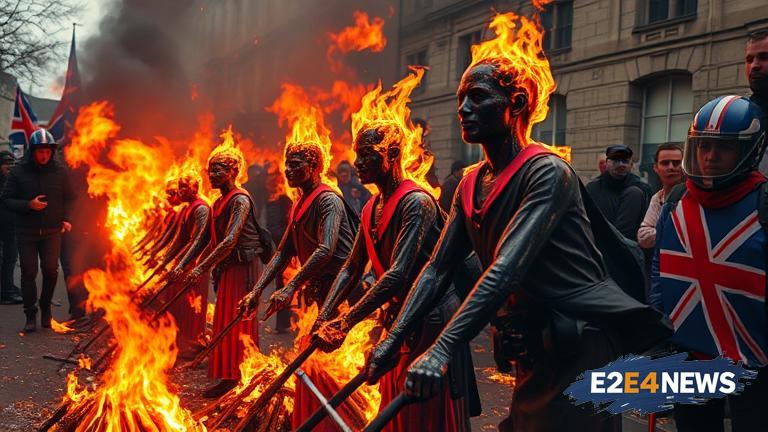A recent protest in the United Kingdom has ignited a firestorm of controversy after effigies of migrants were set alight, symbolizing the deep-seated tensions and divisions within the country regarding immigration policies. The protest, which was marked by a bonfire of these effigies, was a stark display of the sentiments held by some segments of the population towards migrants. Despite the provocative nature of the act, local law enforcement decided against intervening, citing reasons that have not been fully disclosed to the public. This decision has been met with both support and criticism, with some arguing that it was a necessary measure to prevent escalation and others claiming it was a dereliction of duty to protect public safety and prevent hate crimes. The incident has sparked a national conversation about the limits of free speech, the role of law enforcement in managing protests, and the impact of such actions on community relations and social cohesion. Critics of the protest argue that setting effigies of migrants on fire is a hate-filled act that promotes violence and discrimination, undermining the principles of inclusivity and respect that are foundational to a healthy society. On the other hand, supporters of the protest view it as a form of political expression, albeit a controversial one, that highlights their concerns about immigration and its perceived impact on the country. The UK has been grappling with immigration issues for years, with debates often becoming highly polarized and emotional. This incident has brought these underlying tensions to the forefront, challenging policymakers and community leaders to find a balance between respecting the right to protest and maintaining public order and safety. The decision by police not to intervene has also raised questions about the consistency of law enforcement policies and the criteria used to determine when intervention is necessary. As the situation continues to unfold, there are calls for a more nuanced approach to addressing the grievances of all parties involved, while also ensuring that the rights and dignity of migrants are protected. The international community is watching closely, as the handling of this situation could have implications for how similar incidents are managed in the future. In the midst of this controversy, there are also voices advocating for dialogue and understanding, emphasizing the need for a comprehensive and compassionate immigration policy that addresses the concerns of citizens while upholding the human rights of migrants. The coming days and weeks will be crucial in determining how this situation is resolved and what measures are taken to prevent such incidents in the future. Ultimately, the goal should be to find a path forward that respects the diversity of opinions within the UK while promoting a society that is inclusive and respectful of all individuals, regardless of their background or immigration status.
